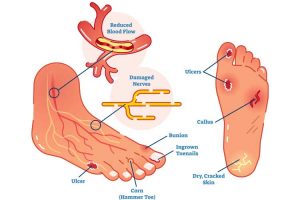Green Point

Diabetes Assessment Green Point
East Gosford Podiatry servicing the Green Point area for Diabetes Assessments and on-going general foot care to keep your feet in the best possible shape.
Diabetes can have a negative impact on foot health. Having a Diabetes Assessment will enable us to identify your risk level and educate you on the steps needed to reduce the chance of foot complications.
Contact our Green Point Podiatrists today to book your appointment.
Book your Diabetes Assessment Green Point with our team of highly experienced Podiatrists.
How does Diabetes affect your feet?
Diabetes is a serious and complex condition that can affect your entire body, including your feet. The reason why your feet are at risk when you have diabetes is because diabetes can cause damage to the nerves in your feet which can reduce blood circulation and you can lose feeling and this puts you at greater risk of developing ulcers and increases risk of infection and amputation. Losing sensation and feeling in your feet is called peripheral neuropathy.
Including a podiatrist in your team of health care providers can reduce your risk of amputation by up to 85%. Our podiatrists are highly experienced in thoroughly assessing the vascular status of diabetics.
While a diagnosis of diabetes does not mean you are a certainty of developing foot problems, it does increase the likelihood of lower limb complications.
Particularly where other risk factors are involved such as smoking, being inactive, being over-weight or erratic blood glucose levels, diabetic complications can have very serious ramifications. In the worst-case scenario, ulcerations, gangrene or even amputation may be the end result…but, there is good news.
Many diabetic risk factors can be managed relatively well with early identification and a little education. Having a Diabetes Assessment will enable us to identify your risk level and educate you on the steps needed to reduced the chance of foot complications.

What is assessed at a Diabetes Assessment Green Point?
- Blood Flow and Circulation
Sufficient blood flow is essential in maintaining good foot health. Blood carries the oxygen to your feet to maintain tissue health and promote healing. It also carries white blood cells to fight infection.
Long term diabetes and increased blood glucose levels can lead to narrowing and hardening of the major arteries in the legs and foot. This can occur through the calcification of the vessels or a build-up of plaque in the arteries.
Unfortunately, this makes people with diabetes more prone to tissue breakdown, ulcers, and infection.
Signs of a reduced peripheral blood supply include:
- Feet that are cold to touch
- A lack of hair on the lower leg, feet and toes.
- Reddish-blue or purple appearance in the feet.
- Sharp leg pain after brisk walking, especially up hills or stairs
- Pain in the feet, even at rest (often in bed)
- Cuts which are slow to heal.
The presence of Peripheral Neuropathy significantly increases your risk of foot complications. Understanding this condition and good education is crucial in managing neuropathic change.
- Nerve Changes and Peripheral Neuropathy
Nerves in your lower legs and feet have 2 primary roles. These are the motor function, to enable you to move and use your muscles, and the sensory function, to allow you to feel pressure, pain and temperature. Your nerves also indirectly manage the blood flow to your feet.
One of the complications associated with diabetes is nerve changes or peripheral neuropathy. This can affect both your function and sensation.
Symptoms indicating nerve damage or change include:
- Burning pains in the legs and feet, usually more noticeable in bed at night
- Numbness
- Tingling, pins and needles sensation in the feet
- Coldness of the legs and feet
- Biomechanical, positional and pressure changes
The 3rd primary risk factor associated with diabetes is the shape and pressure distribution of the foot. Common positional changes and deformities such as bunions, hammer toes or bony prominences can become high risk areas. Identifying these regions, educating the patient and implementing pressure reduction strategies can significantly reduce the risk of complication.
Medicare Chronic Management plan and DVA referral programs are accepted for this assessment.
East Gosford Podiatry specialising in Diabetes Assessments covering East Gosford Podiatrist, Erina Podiatrist, Gosford Podiatrist, Green Point Podiatrist, Kincumber Podiatrist, Point Clare Podiatrist, Terrigal Podiatrist, Wyoming Podiatrist,
